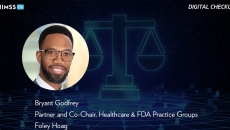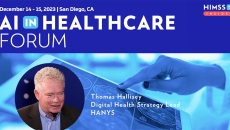Public Policy
Bryant Godfrey, partner and cochair of healthcare and FDA practice groups at Foley Hoag, discusses the various agencies regulating AI in healthcare, potential inconsistencies in frameworks and expectations for regulation in the coming year.
Sara Shanti, partner at Sheppard Mullin, discusses the intersection of healthcare and technology, how to establish trust and transparency within AI, and questions she receives pertaining to virtual therapy, particularly in mental health.
Dr. Don Rucker, chief strategy officer for 1upHealth, discusses TEFCA going live, ONC's Health IT Certification Program, key takeaways from the final HTI-1 and how ONC's certification rule may burden both providers and vendors.
Digital health leaders say frameworks already exist that can be adopted for AI regulation, but going too far with rules could stifle innovation.
Brigid Bondoc, partner and life sciences attorney at Morrison Foerster, discusses government priorities pertaining to federal regulation of AI, where complications may arise, and concerns she has heard related to policy decisions.
Jay Rughani, investment partner at a16z, discusses 2023 events, predictions for digital health funding in 2024 and proper AI regulation to avoid stifling innovation.
Thomas Hallisey, HANYS digital health strategy lead, discusses appropriate regulations on digital health at the state and federal levels and the need for continuous management as technology moves from automating healthcare to augmenting it.
The American Medical Association uses “augmented intelligence,” not “artificial intelligence,” as the tech is meant to support, not replace, people, said Dr. Jesse Ehrenfeld, president of the AMA. Still, new regulatory paradigms are needed.
The kit was determined to be comparable to a device used in clinically-administered intrauterine insemination.







